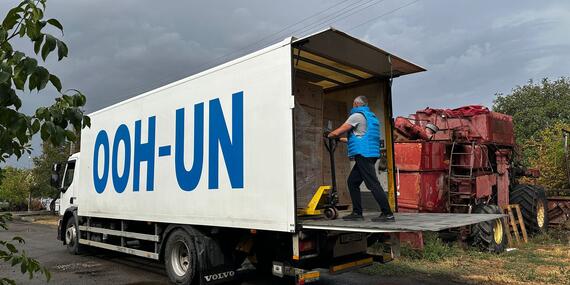Today's top news: Occupied Palestinian Territory, Ukraine

Occupied Palestinian Territory
Gaza
OCHA reports that despite the challenges – including active hostilities, ongoing insecurity, lack of public order and safety, as well as access constraints – the UN and other humanitarian organizations in Gaza continue to do everything possible to provide life-saving aid to Palestinians.
There has been some progress in the health sector, with the start of the polio campaign and the restoration of some health services.
Humanitarian partners say that between 19 August and the end of last month, 450,000 cooked meals prepared in 130 kitchens were provided daily to families across the Gaza Strip.
However, despite this progress, the humanitarian situation in Gaza remains beyond catastrophic, and we still lack the conditions necessary to support people near the scale of the needs.
The quantity of cooked meals provided represents a 35 per cent decrease compared with up to 700,000 meals provided at more than 200 kitchens in early July. This is in part attributed to the multiple evacuation orders issued by Israeli forces, with at least 70 kitchens forced to either suspend cooked meal provision or relocate.
Similarly, partners report that more than one million people did not receive any food rations in August in southern and central Gaza. Partners lack sufficient food stocks to meet requirements for the second consecutive month and will only be able to provide one food parcel to families in central and southern Gaza during the September distribution cycle.
Ongoing hostilities, insecurity, damaged roads, the breakdown of law and order, and access limitations have resulted in critical shortages of aid commodities to sustain operations, increasing the risk of spoilage and infestation of stranded food supplies due to high temperatures.
To address food insecurity, it is critical to address other sectors at the same time, particularly ahead of the upcoming winter season.
If roads and the provision of health care – as well as energy, water, sanitation, hygiene and shelter conditions – are further compromised, there is a high risk that the food insecurity and malnutrition situation will worsen beyond the already alarming rates observed across the Strip.
In a social media post today, the Commissioner-General of the UN Relief and Works Agency for Palestine Refugees in the Near East (UNRWA), Philippe Lazzarini, said that 11 months into the war, international media crews are still banned from entering Gaza to report on the humanitarian impact. Critical work is being carried out by local journalists and by the humanitarian community on the ground, who regularly share reports and images from Gaza.
West Bank
OCHA reports that Israeli forces continue to utilize lethal war-like tactics – including airstrikes – in Jenin, Tubas and Tulkarm governorates. Today, this has resulted in additional fatalities and injuries, and more roads, infrastructure and vehicles have been destroyed or damaged.
Medical facilities have been virtually besieged for over a week now, with heavy restrictions imposed on the movement of ambulances and medical staff.
OCHA warns that this is deepening people's humanitarian needs, as well as insecurity, and raises concerns over excessive use of force.
In the West Bank, Israeli forces must adhere to international law enforcement standards, where lethal force and firearms should only be used as a last resort and only against imminent threats of death or serious injury. Humanitarian access must be allowed and unhindered.
Ukraine
An inter-agency convoy delivered three trucks of humanitarian assistance to a community in Ukraine's Kherson Region. There are still nearly 2,000 people living in Beryslav, including more than 70 children and 90 people with limited mobility. Despite constant shelling, they have not evacuated the area, which has no electricity, gas or water due to damaged infrastructure.
This was the ninth convoy to reach front-line communities in Kherson this year. Aid workers delivered a portable power station, hygiene items, bedding, blankets, and warm clothing.
OCHA reports that today, there were nearly 30 civilian casualties caused by hostilities in the Donetsk Region, in eastern Ukraine and the Sumy Region, in the north. Homes, stores, agricultural assets and gas and electricity infrastructure were also reportedly damaged.
The Ukrainian Government has launched the mandatory evacuation of children and their caregivers from another 40 towns and villages in the Donetsk Region.
